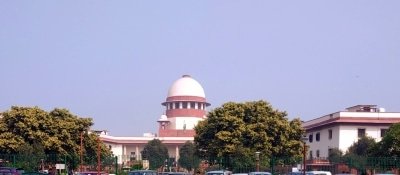New Delhi, March 18 (IANS) In a landmark judgement, the Supreme Court on Wednesday used powers under Article 142 of the Constitution to restrain Manipur Minister Thounaojam Shyamkumar from entering the Legislative Assembly.
A bench headed by Justice R.F. Nariman also ordered that Shyamkumar, who defected to the BJP from Congress, will cease to be a minister from immediate effect.
“We are constrained to use our powers under Article 142 of the Constitution. Respondent No. 3 (Shyamkumar) is restrained from entering the Legislative Assembly till further orders of this court. Needless to add, he will cease to be a Minister of the Cabinet immediately,” said Justice Nariman.
The apex court took this decision after Speaker Y. Khemchand Singh, even after the one month’s period given by the apex court, failed to decide on the disqualification petition pending against Shyamkumar. Instead, the Speaker sought adjournment for eight weeks on the matter.
On January 21, the apex court in a verdict made it crystal clear that Speaker cannot indefinitely sit on disqualification petition. The court also noted that it was assured that latest by 10 days from March, 4, the decision would be taken, but nothing has been done yet.
Justice Nariman observed that such delay, “exhorts us to take up the matter today itself and decide the matter ourselves”.
Solicitor General Tushar Mehta, appearing for the Speaker, appealed to the court that the matter may be deferred till March 28, which could give enough time for a judgment on the disqualification applications by the Speaker. “He also pointed out that, in point of fact, 28th March, 2020, has been notified for pronouncement of judgment by the Speaker,” the court observed.
“We went out of our way to give the Speaker a chance to perform his functions under the Tenth Schedule to the Constitution by stating that, given the fact that such a long period had already gone by without any decision, one month should suffice for the Speaker to decide the disqualification petitions before him.”
The top court’s observation came in a case of disqualification of Forest and Environment Minister Thounaojam Shyamkumar in Manipur. Shyamkumar had won on a Congres ticket, but switched to the BJP-led government in the state. The Congress had won 28 seats in 2017 in Manipur Assembly election and BJP got 21.
Later, the BJP aligned with National People’s Party (NPP) along with Shyamkumar, who went on to become a minister in the government. The Congress filed a disqualification petition before the Speaker, but there was no action on it.
In the verdict on January 21, the top court held that the Speaker can’t sit on a disqualification petition indefinitely. It emphasised that it is essential for the Speaker to decide on the matter within a reasonable time period, and recommended the disqualification petitions should be decided within three months. “A period of three months from the date on which the petition is filed is the outer limit within which disqualification petitions filed before the Speaker must be decided if the constitutional objective of disqualifying persons who have infracted the Tenth Schedule is to be adhered to,” the court said.
The court reckoned the Parliament may seriously consider amending the Constitution to substitute the Speakers of the Lok Sabha and Legislative Assemblies as arbiter of disputes concerning disqualification which arise under the Tenth Schedule with a permanent Tribunal headed by a retired Supreme Court Judge or a retired Chief Justice of a High Court, or some other outside independent mechanism “to ensure that such disputes are decided both swiftly and impartially”.
Article 142 says the Supreme Court in the exercise of its jurisdiction may pass such decree or make such order as is necessary for doing complete justice in any cause or matter pending before it, and any decree so passed or orders so made shall be enforceable throughout the territory of India in such manner as may be prescribed by or under any law made by Parliament and, until provision in that behalf is so made, in such manner as the President may by order prescribe.
–IANS
ss/vd
